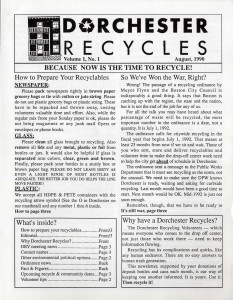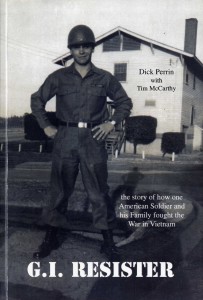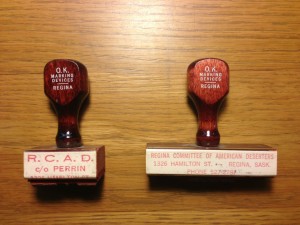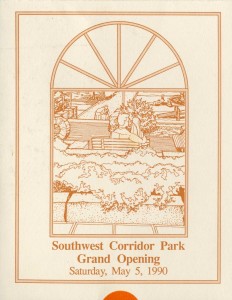I thought that it would be fun to highlight the records of a local community group that had ties to UMass Boston for my final Archives Month post. The Dorchester Recycling Volunteers was an all-volunteer organization that strove to educate the public on recycling issues, and worked with the Mayor’s Office of Neighborhood Services and the City of Boston’s Environment Department to establish a recycling drop-off program in Dorchester. The DRV’s recycling program began at the University of Massachusetts Boston on July 15, 1989. A station was established in the Service and Supply parking lot for monthly drop-offs of recyclable materials. From a September 15, 1989 memo from Chancellor Sherry H. Penney to the university community:
“I am pleased to announce that the recycling project we implemented a short time ago has been very successful. Workers from the Dorchester Recycling Volunteers reported that 144 cars dropped off 16,000 pounds of newspapers and hundreds of glass jars and bottles during the six hour collection period on August 19th. That was up from 46 cars and 1000 pounds on our first collection day in July, an astounding 155% increase in the number of cars unloaded.” [folder 8]
The DRV ended its program when Mayor Raymond L. Flynn established a citywide curbside recycling program in Boston in November 1994.
The Dorchester Recycling Volunteers records span 1989-1994 and include internal meeting notes, minutes of meetings with the Boston Recycling Coalition, volunteer lists, operation files, the DRV newsletter, correspondence, and general recycling information.
View the finding aid for the records of the Dorchester Recycling Volunteers here.
For questions about this collection or to schedule a research appointment, please contact library.archives@umb.edu or 617-287-5469.

To celebrate Archives Month, I will be posting highlights from our collections throughout October. I hope that this will turn into a regular series. To learn more about Archives Month, visit the Society of American Archivists website.
University Archives & Special Collections in the Joseph P. Healey Library at UMass Boston collects materials related to the university’s history, as well as materials that reflect the institution’s urban mission and strong support of community service, notably in collections of records of urban planning, social welfare, social action, alternative movements, community organizations, and local history related to neighboring communities.
University Archives & Special Collections welcomes inquiries from individuals, organizations, and businesses interested in donating materials of an archival nature that that fit within our collecting policy. These include manuscripts, documents, organizational archives, collections of photographs, unique publications, and audio and video media. For more information about donating to University Archives & Special Collections, click here or email library.archives@umb.edu.






![Campaign flyer for U.S. House of Representatives election. [1998]](https://blogs.umb.edu/archives/files/2015/10/JC-26_VII_f8-1k1olcc-200x300.jpg)












![SC-0137_IV_f1_001 Southwest Corridor Project. Relocated Orange Line/railroad improvements, [1977]](https://i0.wp.com/blogs.umb.edu/archives/files/2015/10/SC-0137_IV_f1_001-1w0gf1v.jpg?w=94&h=155&ssl=1)







![SC-0040_13-38_pig-undated Pig, undated [circa 1913-1942]](https://i0.wp.com/blogs.umb.edu/archives/files/2015/10/SC-0040_13-38_pig-undated-1pkrjp9.jpg?w=179&h=179&crop=1&ssl=1)
![SC-0040_13-38_goat-undated Goat, undated [circa 1913-1942]](https://i0.wp.com/blogs.umb.edu/archives/files/2015/10/SC-0040_13-38_goat-undated-sj18ua.jpg?w=179&h=179&crop=1&ssl=1)
![SC-0040_13-38_cat-undated Cat, undated [circa 1913-1942]](https://i0.wp.com/blogs.umb.edu/archives/files/2015/10/SC-0040_13-38_cat-undated-2gc8q86.jpg?w=179&h=179&crop=1&ssl=1)
![SC-0040_13-38_geese-undated Two geese, undated [circa 1913-1942]](https://i0.wp.com/blogs.umb.edu/archives/files/2015/10/SC-0040_13-38_geese-undated-17mch9q.jpg?w=179&h=179&crop=1&ssl=1)
![SC-0040_13-38_cow-and-calf-undated Cow and calf, undated [circa 1913-1942]](https://i0.wp.com/blogs.umb.edu/archives/files/2015/10/SC-0040_13-38_cow-and-calf-undated-2bljnat.jpg?w=179&h=179&crop=1&ssl=1)